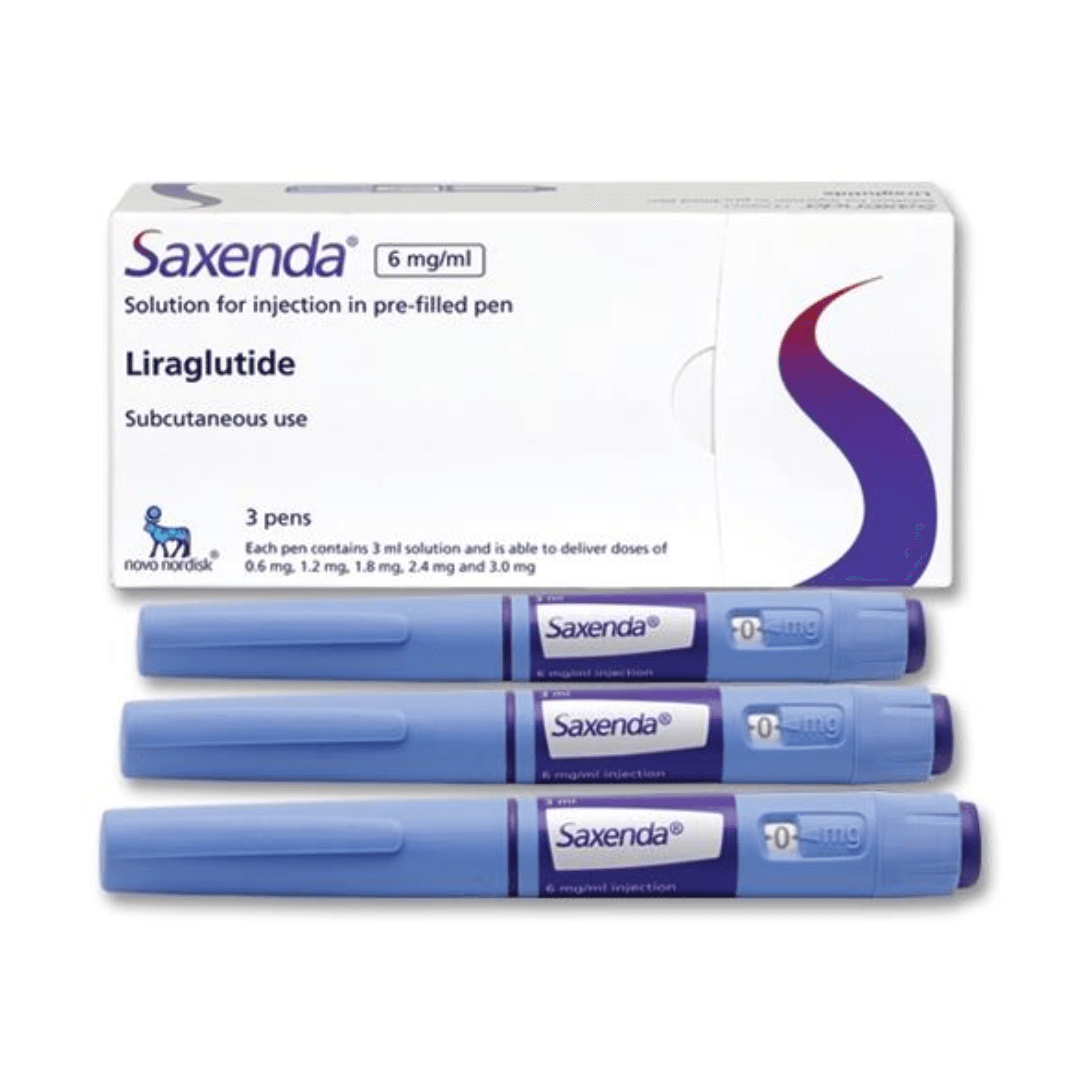Can you get Saxenda on the NHS?

Related products
Who is Eligible for Saxenda?
Not everyone is a suitable candidate for Saxenda. Specific criteria must be met for a healthcare provider to prescribe this medication. Generally, Saxenda is prescribed for adults who have a Body Mass Index (BMI) of 30 or higher, or 27 or higher with at least one weight-related medical condition such as hypertension or Type 2 diabetes.
The importance of medical consultation cannot be overstated. "Without a thorough medical evaluation, the risks may outweigh the benefits," warns Dr. Mark Roberts, a General Practitioner in Manchester. A healthcare provider will typically conduct blood tests, check your medical history, and assess other medications you may be taking before prescribing Saxenda. This comprehensive check-up ensures the drug will not interact adversely with other medicines or worsen existing medical conditions.
Once the criteria are met and the medical consultation is complete, the healthcare provider may decide to prescribe Saxenda. It's imperative to note that Saxenda should be part of a broader lifestyle modification programme, involving a balanced diet and regular exercise. Saxenda is mostly being phased out in favour of Wegovy.
What is Saxenda and How Does it Work?
Saxenda emerges as a game-changer in the world of weight loss medications. This injectable drug has been making waves in the UK for its promising results in aiding obesity treatment. Manufactured by Novo Nordisk, Saxenda isn't just another weight loss pill; it's an innovative approach to tackling obesity.
The active ingredient in Saxenda is liraglutide, a glucagon-like peptide-1 (GLP-1) receptor agonist. "It mimics the action of GLP-1, a hormone produced by the intestine, which signals the brain to feel full after a meal," says Dr. Sarah Johnson, a leading endocrinologist based in London. This process essentially curbs your appetite, making you eat less and, therefore, lose weight.
Liraglutide's effects on appetite suppression aren't the only perks it offers. It also has a two-pronged impact on weight loss by regulating blood sugar levels. When blood sugar is maintained within a healthy range, your body is less likely to store fat, contributing to weight loss in the long term.
Several clinical trials have backed the efficacy of Saxenda. A study conducted by the British Medical Journal found that individuals using Saxenda lost an average of 5-10% of their body weight over a six-month period. "It's a remarkable advance in the weight loss medication spectrum," comments Dr. Emily Clark, a noted obesity researcher.
Is Saxenda Available on the NHS?
One question that looms large for UK residents is whether Saxenda is available on the National Health Service (NHS). As of September 2023, Saxenda is generally not funded by the NHS for obesity treatment. The drug is considered a 'specialist' medication and typically falls outside regular NHS coverage.
However, exceptions do exist. "In certain cases, like severe obesity with complications, the NHS might consider funding Saxenda," states Dr. Michelle Graham, a healthcare policy analyst. These exceptions are rare and are often scrutinised carefully against a set of strict criteria. If you believe you qualify for an NHS exception, it's crucial to consult your healthcare provider for an in-depth analysis and potential approval.

What Do the Guidelines from NICE Say About Saxenda?
The National Institute for Health and Care Excellence (NICE), the body that provides national guidance and advice to improve health and social care in the UK, has also weighed in on Saxenda. As of now, NICE has not universally endorsed Saxenda for use in the NHS. Their guidelines are often cited by healthcare professionals for prescribing medications and determining NHS coverage.
"The NICE recommendations heavily influence NHS funding decisions," says Dr. Victoria Smith, a health economics researcher at the University of Oxford. Although Saxenda has proven clinical benefits, the absence of an endorsement from NICE makes it challenging for the medication to be incorporated into routine NHS-funded obesity treatment programmes. Nonetheless, any future revision in NICE guidelines could potentially change this, opening the door for wider NHS coverage.
In summary, Saxenda offers a promising avenue for weight loss treatment, but its availability through the NHS remains limited. Whether or not you're eligible for this medication hinges on various factors, and a detailed consultation with a healthcare provider is imperative for proper guidance.
How Does Saxenda Compare to Other Weight Loss Treatments?
When it comes to obesity treatment, Saxenda isn't the only game in town. The NHS covers several other weight loss medications such as Orlistat, which prevents the absorption of fats from your diet, and Sibutramine, which affects neurotransmitters in the brain. However, how does Saxenda stack up against these alternatives?
"Each weight loss medication has its own unique mechanism of action and potential side effects," explains Dr. Fiona Lewis, a consultant in metabolic medicine. Orlistat, for instance, might cause gastrointestinal issues, while Sibutramine may increase blood pressure. Saxenda, with its GLP-1 receptor agonist liraglutide, provides a comparatively smoother sailing experience, with fewer potential complications.
A comparative study published in the Lancet journal showed that participants on Saxenda lost more weight than those on Orlistat or Sibutramine over a 12-month period. "The effectiveness of Saxenda in weight loss and maintenance surpasses other NHS-covered medications, though it is essential to consider the full clinical picture, including side effects, when choosing a treatment", states Dr. Neil Wilson, a researcher at Imperial College London.
When it comes to safety, Saxenda has been subject to rigorous clinical trials. "The risk profile is relatively mild, making it a suitable option for a broader demographic," comments Dr. Lauren Hayes, a pharmacologist. However, as with any medication, it's crucial to consult with a healthcare provider for a tailored treatment plan.
Cost Implications: Is it More Economical to Get Saxenda on the NHS?
The cost of obesity treatment is often a significant consideration. If you're considering Saxenda, you might wonder whether it would be more economical if the drug were covered by the NHS. Presently, Saxenda is usually only available through private channels and can cost around £200-£250 per month in the UK.
"Financially, it would certainly be more advantageous for the patient if Saxenda were covered by the NHS," notes Dr. David Collins, an expert in healthcare economics. However, the broader implications for the NHS budget could be substantial given the high cost of the medication and the rising obesity rates in the country.
If Saxenda were to be available through the NHS, it could alleviate the financial burden on individuals requiring obesity treatment. However, the high cost also raises questions about sustainability for the NHS. "It's a complex issue that needs a balanced approach, taking both individual and systemic costs into account," says Dr. Sarah Thompson, a healthcare policy consultant.
What are the Alternatives if Saxenda Isn't Covered?
If Saxenda isn't an option for you, either due to medical reasons or because it's not covered by the NHS, don't lose hope; there are alternatives. NHS-supported weight loss strategies often begin with lifestyle changes. These include a balanced diet and physical exercise, supported by medications like Orlistat when necessary.
"Lifestyle modifications are always the first line of treatment and often yield great results," emphasises Dr. Rebecca Green, a nutritionist and public health consultant. Dietary changes, combined with regular physical activity, can significantly impact weight loss, though it might take longer compared to pharmaceutical interventions.
If lifestyle changes don't yield sufficient results, medications like Orlistat may be prescribed. These are generally covered by the NHS and offer a less expensive route for weight loss treatment. However, they may come with their own set of side effects and considerations.
Lastly, surgical interventions like bariatric surgery might be considered for severe obesity cases. "Bariatric surgery has proven highly effective, but it's usually reserved for extreme cases due to its invasiveness and potential complications," states Dr. Richard Harris, a bariatric surgeon.
While Saxenda offers a promising treatment avenue, it's one among a variety of options. The key is to consult with healthcare professionals to find the most appropriate and effective treatment for you.
Recently Searched Questions
How effective is Saxenda for weight loss?
Many people frequently ask how effective Saxenda is for weight loss. Clinical studies in the UK have consistently shown its efficacy. "In trials, we've seen patients lose up to 5-10% of their body weight within six months," says Dr. Karen Williams, a medical researcher in obesity studies. However, the effectiveness can vary from person to person and often depends on lifestyle changes accompanying the medication.
Can Saxenda be used long-term?
The next question that often surfaces is about the long-term use of Saxenda. "Saxenda is generally considered safe for long-term use, especially if it helps to maintain weight loss and presents minimal side effects", states Dr. Helen Smith, a General Practitioner. However, continuous medical evaluation is crucial for long-term treatment.
Are there any risks or side effects?
Yes, like any medication, Saxenda has potential side effects. These range from nausea to more serious ones like pancreatitis. "The side effects are generally manageable, but it's crucial to report any unusual symptoms to your healthcare provider," cautions Dr. Timothy Jackson, a pharmacovigilance expert.
Is Saxenda covered by insurance?
Insurance coverage for Saxenda varies, and in the context of the UK, it's usually not covered by the NHS. However, some private health insurance plans might include it. "If you're looking to cover the cost via insurance, it's essential to read your policy carefully," recommends Dr. Sylvia Clark, a healthcare insurance consultant.
How quickly can I lose weight with Saxenda?
The rate of weight loss with Saxenda varies from individual to individual. "Patients can expect to see noticeable results within the first few weeks, especially when combined with lifestyle modifications," states Dr. Daniel Philips, a weight loss specialist.
Can I get Saxenda without a prescription?
The unequivocal answer is no. Saxenda is a prescription-only medication in the UK. "Obtaining Saxenda without a prescription is not only illegal but also potentially dangerous," warns Dr. Angela Ford, a regulatory affairs expert in pharmaceuticals.
Personal Experiences: Case Studies
Individuals who have successfully accessed Saxenda through the NHS
Though rare, there are instances where individuals have successfully accessed Saxenda through the NHS. One such case is Sarah, a 35-year-old from Liverpool, who had a BMI of 35 and severe sleep apnoea. After an extensive medical evaluation, her healthcare provider deemed her eligible for NHS-funded Saxenda. "The drug was a turning point in my weight loss journey, and it didn't drain my finances since it was covered by the NHS," Sarah notes.
Challenges faced in acquiring the medication
Accessing Saxenda, especially through the NHS, isn't without challenges. George, a 45-year-old with a BMI of 31 and diabetes, recalls his struggle. "My initial application for NHS-funded Saxenda was rejected despite my healthcare needs," he says. George had to appeal the decision and present further medical evidence to eventually receive the medication. "The process was arduous but ultimately worth it," he adds.
These personal experiences highlight the potential benefits and challenges of accessing Saxenda for obesity treatment in the UK. Whether you fit the criteria for NHS coverage or opt for private channels, the journey with Saxenda is one that requires careful consideration and medical guidance.
Professional Opinions and Recommendations
Medical experts' viewpoints on Saxenda's availability on the NHS
Medical experts are divided on the issue of Saxenda's availability on the NHS. Some believe that the medication's effectiveness warrants its inclusion. "Given the obesity crisis we're facing, Saxenda's proven efficacy could be a valuable addition to the NHS's arsenal against weight gain", argues Dr. Caroline Mitchell, a consultant endocrinologist.
On the other side, there are concerns about the cost implications for the NHS, which is already under significant financial strain. "While Saxenda's results are promising, its high cost could pose a challenge to NHS resources," notes Dr. Harry Thompson, an expert in public health and health economics.
Potential changes in future NHS policy
There's a growing buzz around potential changes to NHS policy concerning Saxenda, especially in light of updated guidelines from NICE. "Given the rising obesity statistics in the UK, the NHS might have to reconsider its stance on Saxenda, but it would require a thorough cost-benefit analysis", states Dr. Rachel Ward, a healthcare policy consultant.
These expert opinions illustrate the complexities involved in making Saxenda more widely available on the NHS. It's a hotly debated issue that integrates clinical efficacy, patient needs, and budgetary considerations.
Concluding Remarks
Summary of the current status of Saxenda on the NHS
As it stands, Saxenda is generally not covered by the NHS in the UK, except in rare cases that meet stringent criteria. However, the medication is available through private healthcare channels, albeit at a significant cost. The debate on its inclusion in NHS schemes continues to rage, especially among medical experts and policymakers.
Suggestions on what to do if you are considering Saxenda for weight loss
If you are considering Saxenda for weight loss, the first step is to consult a healthcare provider for a comprehensive medical evaluation. "Saxenda is a prescription-only medication, and its suitability has to be assessed on an individual basis," says Dr. Emily Foster, a General Practitioner. Should you not meet the criteria for NHS-funded Saxenda, you might explore other weight loss medications or treatments that are covered.
FAQs: Quick Answers to Common Questions
What is the standard dosage for Saxenda?
The standard dosage for Saxenda is an initial 0.6 mg per day, gradually increased to a maintenance dose of 3.0 mg daily. "Adhering to the prescribed dosage is crucial for both efficacy and safety," advises Dr. Sarah Davis, a clinical pharmacologist.
How can I apply for NHS coverage for weight loss treatments?
To apply for NHS coverage, you'll need to consult with your GP, who can refer you to a specialist if necessary. "The application process may include a variety of tests and evaluations to determine your eligibility," says Dr. Martin Lewis, a consultant in metabolic medicine.
Where can I find NHS clinics that may prescribe Saxenda?
Locating an NHS clinic that may prescribe Saxenda can be a bit of a maze. "Your best bet would be to start with your GP, who can provide referrals to specialized clinics that may offer Saxenda as a treatment option, although this is rare," informs Dr. Linda Harrison, a healthcare navigator.
In summary, while Saxenda offers a promising route for obesity treatment, its availability on the NHS is currently limited. Should you consider this option, it's imperative to consult healthcare professionals for an accurate diagnosis and tailored treatment plan.











 Rated Excellent by 26,523+ Reviews
Rated Excellent by 26,523+ Reviews